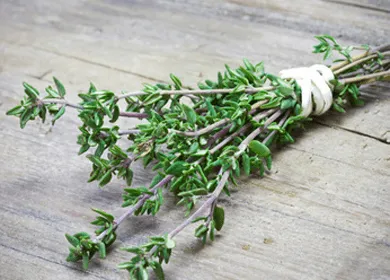
- Share on Facebook174
- Share on Pinterest
- Share on Twitter
Sinusitis occurs as a result of inflamed mucus membranes, and is especially prevalent in spring due to many people’s sensitivity to pollen and other outdoor allergens. While physicians are quick to prescribe antibiotics and powerful antihistamines to treat sinus infections, there are many natural ways to choose from to reduce inflammation and quickly break up congestion of the airways, as well as to soothe the headaches, fever, pain and fatigue associated with this condition.
Many naturopaths and holistic practitioners recommend thyme to combat sinus problems. Thyme is a powerful herb hailing from the Mediterranean region and dating back to the 11th century. Today, it grows all over the United States and flourishes in hot and sunny climates. While it has a wide array of uses, as it has properties that cleanse all organs of the body, thyme is especially effective in tackling sinus problems. According to Phyllis A. Balch, author of Prescription for Herbal Healing, “thyme’s essential oil stimulates cilia to push congested mucus outward and encourages expectoration of phlegm.”
 One traditional home remedy for clearing sinuses and respiratory passages is a tea made from equal parts thyme and plantain. Steep the thyme and plantain together, and then add juice from half of a lemon. Sweeten with stevia leaf or coconut crystals if desired, and sip throughout the day. A simple thyme infusion on its own can also work wonders. One word of caution: thyme is very potent, so it is wise to consult a naturopath before use, especially if you suffer from other health issues.
One traditional home remedy for clearing sinuses and respiratory passages is a tea made from equal parts thyme and plantain. Steep the thyme and plantain together, and then add juice from half of a lemon. Sweeten with stevia leaf or coconut crystals if desired, and sip throughout the day. A simple thyme infusion on its own can also work wonders. One word of caution: thyme is very potent, so it is wise to consult a naturopath before use, especially if you suffer from other health issues.
Eating certain foods can also ease sinus pain and pressure, thanks to a bioflavonoid compound called quercetin. Quercetin is found in high concentrations in onions, apples, grapes, green tea and red wine. This compound gives support to the immune system and promotes healthy histamine levels, especially if combined with vitamin C or bromelain, an enzyme found in pineapple.
For a relaxing way to break up sinus congestion, try a massage with essential oils of peppermint, tea tree, lavender, eucalyptus or oregano. Make sure to mix these oils with a base oil, as some can be harsh to the skin when applied directly. Apply the mixture to the temples, neck, spine, and bottoms of your feet. Two or more oils can be mixed together for combined effects. You may also wish to try adding a couple of drops of essential oil to your pillow to soothe your sinuses through the night, or to your shower floor before a hot shower to let the vapors work through your respiratory system. Steam inhalation using essential oils is another excellent way to break up mucus.
If you find yourself experiencing chronic, unexplained sinus pressure that does not alleviate no matter what you try, you may consider replacing your pillow. Many allergens build up inside of pillows over time, and as they press directly against your face all night every night, old, musty pillows are common causes of sinus suffering. Breathe easy!
-The Alternative Daily
Sources:
http://wildalchemist.blogspot.com/2009/10/drink-cup-of-thyme-tea-instead-of.html
http://www.livestrong.com/article/506528-thyme-for-sinus-infections/
http://www.wellnessresources.com/supplements/quercetin.php
http://www.oasisbotanica.com/essential-oils-sinus-relief.html
- Share on Facebook174
- Share on Pinterest
- Share on Twitter

